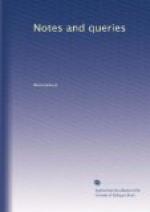MINOR QUERIES.
"A” or “An,” before Words, beginning with a Vowel.—Your readers are much indebted to Dr. Kennedy for his late exposure of the erroneous, though common, use of the phrase “mutual friend,” and I am convinced that there are many similar solecisms which only require to be denounced to ensure their disuse. I am anxious to ask the opinion of Dr. K., and others of your subscribers, on another point in the English language, namely, the principles which should guide our use of “A” or “An” before a word beginning with a vowel, as the practice does not appear to be uniform in this respect. The {351} minister of my parish invariably says in his sermon, “Such an one,” which, I confess, to my ear is grating enough. I conclude he would defend himself by the rule that where the succeeding word, as “one,” begins with a vowel, “An,” and not “A,” should be used; but this appears to me not altogether satisfactory, as, though “one” is spelt as beginning with a vowel, it is pronounced as if beginning with a consonant thus, “won.” The rule of adding or omitting the final “n,” according as the following word commences with a vowel or a consonant, was meant, I conceive, entirely for elegance in speaking, to avoid the jar on the ear which would otherwise be occasioned, and has no reference to writing, or the appearance on paper of the words. I consider, therefore, that an exception must be made to the rule of using “An” before words beginning with a vowel in cases where the words are pronounced as if beginning with a consonant, as “one,” “use,” and its derivatives, “ubiquity,” “unanimity,” and some others which will no doubt occur to your readers. I should be glad to be informed if my opinion is correct; and I will only further observe, that the same remarks are applicable towards words beginning with “h.” An horse sounds as bad as a hour; and it is obvious that in these cases employment of “A” or “An” is dictated by the consideration whether the aspirate is sounded or is quiescent, and has no reference to the spelling of the word.
PRISCIAN.
The Lucky have whole Days.—I, like your correspondent “P.S.” (No. 15., p. 231.), am anxious to ascertain the authorship of the lines to which he refers.
They stand in my Common-place Book as follows, which I consider to be a more correct version than that given by “P.S.":—
“Fate’s dark recesses we can
never find,
But Fortune, at some hours, to all is
kind:
The lucky have whole days, which still
they choose;
The unlucky have but hours, and those
they lose.”
H.H.
Line quoted by De Quincey.—“S.P.S.” inquires who is the author of the following line, quoted by De Quincey in the Confessions of an English Opium Eater:—
“Battlements that on their restless fronts bore stars.”




